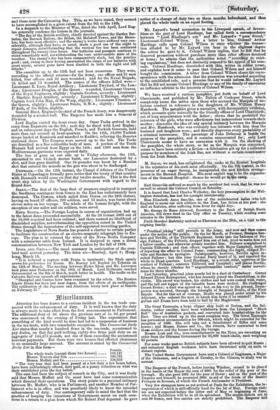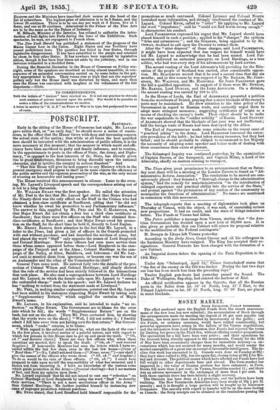giort [tannin.
Attention has been drawn to a curious incident in the tea trade con- nected with the enhancement of duty. It is Well known that the duty is always made to take effect from the first announcement in Parliament. The additional duty of 3d. above the previous rate of 1s. W. per pound was announced on the evening of Friday last. The expectation that something of the kind would be done bad led to a suspension of business in the tea trade, with two remarkable exceptions. The Commercial Daily List states that nearly -a hundred firms in the tea-trade, accustomed to pay duties, on that day paid nothing, eighty-live firms paid duty on an aggregate of 144,475 pounds, not one of them exceeding the accustomed heaviest payments. But there were two houses that effected clearances to an unusually large amount. The account is stated by the Commercial Daily List in this form—
Pounds.
The whole trade [except those two houses] . 148,121 Messrs. Travers and Son 100,781 Messrs. Moffatt and Co 328,635 "The very teas that had been passed at a low duty a few hours before, have been unblushingly offered, duty paid, at a penny reduction on what was their established price the day before."
The case had been the subject of remark in the City, and it was freely said that Messrs. Moffatt and Co. must have had some communication which directed their operations. The story points to a personal intimacy between Mr. Molfatt, who is in Parliament, and another Member of Par- liament who is in office, and was peculiarly likely to know the intended enhancement of duty. Our contemporary calls to mind the fact that the practice of keeping the intentions of Government secret on such occa- sions is a return to a plan from which Sir Robert Peel departed : he gave notice of a change of duty two or three months beforehand, and thus placed the whole trade on an equal footing.
Mr. Layarcl's broad accusation in his Liverpool speech, of favour- itism on the part of Lord Hardinge, has called forth a correspondence between "Lord Hardinge's son" and Mr. Layard's " poor friend," Lieutenant-Colonel Wilson. In a letter to him, Colonel Arthur Hardinge calls upon Colonel Wilson to state whether the transac- tion alluded to by Mr. Layard can bear in the slightest degree the colour he gave to it. Colonel Wilson replies, that he felt that he deserved promotion without purchase more than other officers detained at home ; he admits -that the authorities acted "according to exist- ing regulations," but does not distinctly respond to the appeal of his emu-, rade. Colonel Hardinge, dissatisfied with this, writes in colder terms, and explains how- it came to pass that Colonel Wilson and not himself bought the commission. A letter from Colonel Wilson closes the corre- spondence with the admission that the promotion was awarded according to the established rule, and a promise that he would inform Mr. Layerd that he did not accuse Colonel Hardinge or any of his family of exercising' an influence adverse to the interests of Colonel Wilson.
We have received a curious pamphlet, put forth on behalf of Lord Clanrica.rde, and published by Mr. Dalton of Cockspur Street, which oompletely turns the tables upon those who accused the Marquis of ne•-: farious conduct in reference to the daughters of Mr. William Henry Handeock. The pamphlet gives a narrative, with documentary evidence, which accounts quite naturally for the friendly offices of Lord Clanricarde, out of long acquaintance with the father ; shows that he protected the interests of the girls, who were affectionate but independent towards their mother ; discredits the idea of any special intimacy between the Marquis and Mrs. Ilimdcock, who was evidently less intimate with him than the husband and daughters were ; and directly disproves every probability of a criminal intercourse. The parentage of John Delacour is beside the purpose of the pamphlet, and it remains unaccounted for ; only .Lord. Clanricarde seems to have no cennexign with it. On the showing of the pamphlet, the whole story, so far as the Marquis was concerned, seems to have been entirely a fiction—a fabrication got up for a collateral purpose by members of the Irish Bar, not without a certain countenance' from the Irish Bench.
M. Boyer, we read, has enlightened the cooks at the.Scutari hospitals in the mysteries of his craft moat effectually. On the 9th instant, in the presence of an eager throng, he inaugurated the near kitchen arrange- ments in the Barrack Hospital. His next exploit was to be the organiza- tion of the General Hospital : thence he would go tete camp.
Earl Granville suffered so much by the accident last week that he was too unwell to attend the Cabinet Coancil on Sattirday.
It is feared that Lord Charles Wellesley, the heir presumptive to the Wel- lington dukedom, has lost his eyesight irretrievably.
Miss Elizabeth Anne Smythe, one of the noblehearted ladies who left England to nurse our sick soldiers in the East, has fallen at her post : she died at Kululee, after suffering from fever for eight days.
Mr. George de Bosco Attwood, Secretary to the Bank of British North America, fell down dead in the City office on Tuesday, while reading some minutes to the Directors.
Field-Marshal Radetzky arrived at Florence on the 20th, on a visit to the reigning family.
" Practleal joking" still prevails in the Army, and now and then comes under the notice of the public. On the let March, at Fermoy, Ensigns San- ders and Neville, of the Thirtieth Regiment, broke into the bedroom of En- sign Falkner, of the Fiftieth, dragged him out of bed, tried to make him eat a tallow candle, nd otherwise grossly insulted him.. Falkner complained to Captain Tillbrok ; and that officer, together with Major Campbell, instead of reporting the affair to Colonel Piney, commanding the depet, obliged Ne- ville and Sanders to apologize. Subsequently, however, Neville again in- sulted Falkner ; but this time Colonel Passy heard of it, and reported the whole to Head-quarters. Lord Hardinge, in a recent order, approves of the conduct of Falkner ; censures Tillbrook and Campbell ; and places Neville, whom he sternly rebukes for " ungentlemanlike conduct," tinder surveil- lance for three months.
Last Saturday, practical jokes nearly led to a duel at Canterbury. Cornet Edward Pieton Baumgarten, who has recently joined the Enniskillens, is the victim. His sword was broken, his clothes and bed were soaked with water, and the tail and toppet of his valuable horse were docked; He challenged Cornet Evans ; a duel was agreed on ; but, on his way to the ground, Baum- garten was arrested, through the foresight of Sergeant Brodie, of .the First Royals. But for this act of courage' Brodie was placed under arrest by his Adjutant, who ordered the men to knock him down if he resisted! Baum- garten and Evans have been held to bail by the Magistrates.
The Great Tasmania, a large clipper ship built at Boston, and the Sal- daubs, rather smaller, have been withdrawn from the Liverpool "Black Ball" line of Australian packets, and converted into hospital-shipa for the East. They are fitted up in the most complete war. The Great Tasmania has permanent accommodation for 500 sick, which might be extended for the reception of 1000. She will take out a detachment of Rifles and some horses ; and Messrs. Baines and Co., the owners, have contracted to feed these soldiers and the horses during the voyage. Mears. Leah and Co., iron-manufacturers on the Tyne, are executing an order from the Ottoman Government for 35,000 bomb-shells, each weighing 65 pounds.
For some weeks past no British subjects have been allowed to quit Russia ; and refractory English workmen have been threatened with an exile to distant regions.
The United States Government have sent a Colonel of Engineers, a Major of the Ordnance, and a Captain of Cavalry, to the Crimea, to study war in earnest.
The Emperor of the French, before leaving Windsor, caused to be placed in the hands of the Mayor the sum of 400/. for the relief of the poor of the borough. He also gave 1001. for the poor of Dover ; and on the part of the Empress and himself, he presented 5001. in aid of the funds of the Socieni Francais de Secours, of which the French Ambassador is President.
Very few strangers have as yet arrived at Paris for the Exhibition, the in- auguration of which is still officially fixed for the 1st of May. Foreign visiti ors are not expected before the latter end of May or beginning of June, when the Exhibition will be in all its splendour. The season-tickets are to cost 50 francs, and free entries are strictly prohibited. The Emperor and Empress and the id.inisters have inscribed their names at the heed of the list of subscribers. The highest price of admission is to be 5 francs, and the lowest 20 centimes. There is to be one day per week at 5 francs, five at I franc, and one at 20 centimes. Admissions to the Palace of the Fine Arts are to be the same as for the Palace of Industry. H. Billault, Minister of the Interior, has refused to authorize the intro- duction of bull-fights into Paris during the time of the Exhibition. Such spectacles, he says, are repugnant to French ideas.
The Hew York Herald has published a statement of the progress of the Maine Liquor Law in the Union. Eight States and one Territory have passed prohibitory laws. The question has failed in four States, through legislative disagreement. It has been submitted to the people and retained by them in four other States. It has nowhere been repealed by legislative action, though it has been four times set aside by the judiciary, and in one instance reinacted in a modified form.
During the financial discussion in the House of Commons on Friday sen- night, some of the speakers are described as being almost inaudible, in con- sequence of an animated conversation carried on by some ladies in the gal- lery appropriated to them. Their voices rose so high that not the reporters' gallery only but the House itself was disturbed by them, and more than once the House was convulsed with laughter at the vehemence of the fair disputants.—Globe.



























 Previous page
Previous page